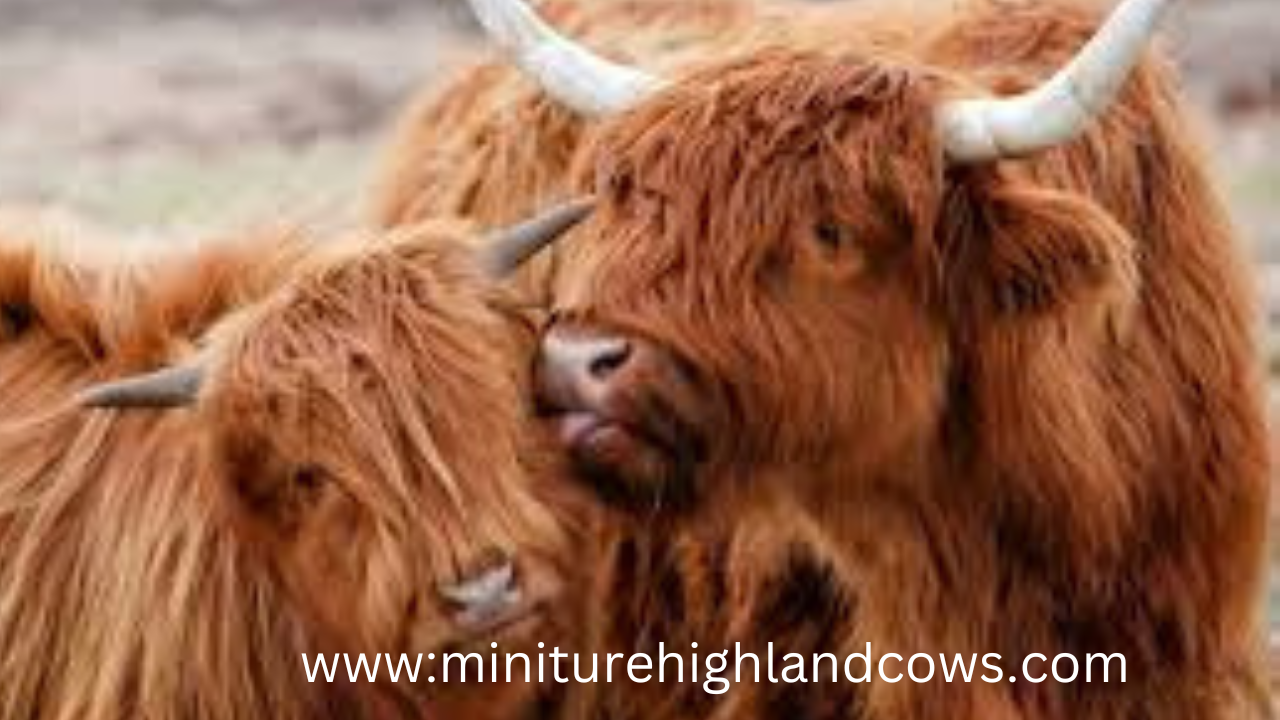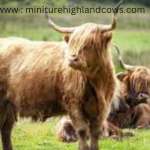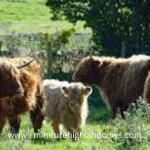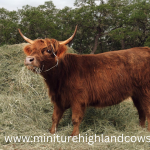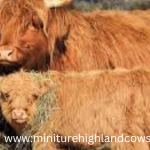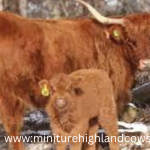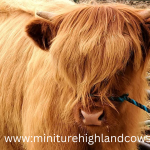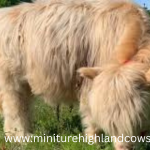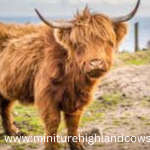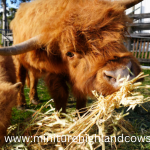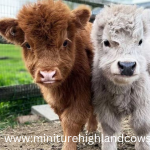A miniature Highland cow is a miniature or downsized version of the original Highland cattle breed. Famous for its long, shaggy coats and elongated horns, this breed is known for hardiness. These cows are admired for their tameness, unique appearance, and smaller scale, which renders them appealing to small-scale farmers, hobbyists, and those seeking a little uniqueness for their homestead.
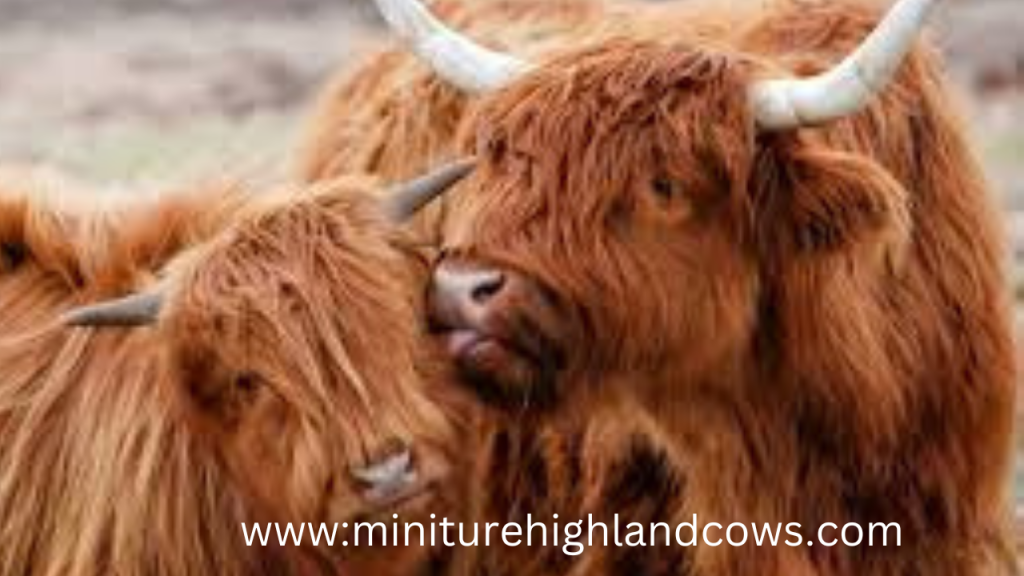
Adult miniature highland cow for sale
There is no such variety as a miniature Highland cow. The term “miniature” sometimes is used to refer to young calves, or smaller individuals within the breed but will achieve full size.
You can find adults Highland cow for sale from several breeders. Here are some resources to help you find one:
- Miniature Highland Cattle Sale: This website gives you an extensive list of breeders selling adult Highland cows.
- Rocking L Ranch: This farm raises miniature Highland cattle and sells their cows to maturity.
- Elm Hollow Farm: This farm also sells mature Highland cows.
If you are to buy a mature Highland cow, the following factors should be in your mind: age, in that particular aspect, for older cows can be calmer and easier to handle; however, they usually have existing health problems.
- Temperament: Highland cows are generally calm and docile but can be high-strung.
- Health: You would like a very healthy cow that has no genetic defect or any problems with health.
- Price: The age, sex, and bloodline of the animal will determine the price to be paid for an adult Highland cow.
Once you identify an adult Highland cow you are interested in, ensure that you research and get the right cow from a reputable breeder. Ensure to see the health records of the cow and ask for a written guarantee about their health.
Adult miniature highland cow price
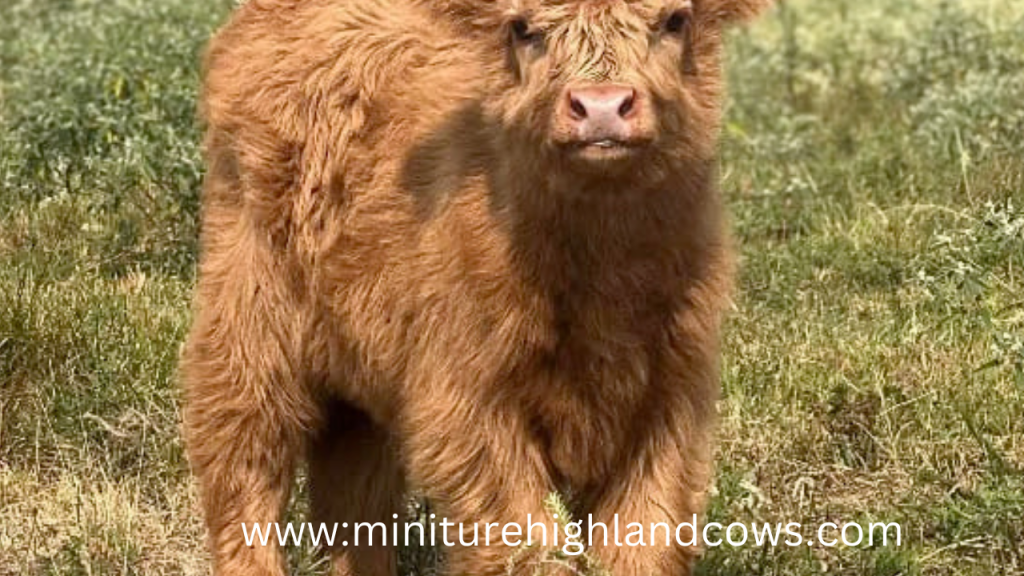
An adult miniature Highland cow’s price can significantly vary due to factors, including age, genetics, health, and whether the animal is registered within a breed association. The average price of an adult miniature Highland cow lies anywhere in the range of $2,000 to $10,000.
Some of the factors that can dictate the price are broken down as follows:
1. Age:
- Calves: Generally, miniature Highland cow calves are relatively cheaper, ranging from $1,500 to $4,000. In some instances, the price is supplemented if the calf’s parents are of good stock or harbors desirable genetics.
- Mature animals: Mature miniature Highland cows range anywhere from $3,000 to $10,000 and could be stretched even further based on excellent animals.
- **Genetics :
- Healthy genetics from champion bloodlines or special traits such as good conformation or rare colors bring a premium price.
- Registration:
The cow is registered with breed organizations such as the Miniature Highland Cattle Association. That will fetch a premium price over an unregistered animal because you know pedigree and purity. - Quality and Purpose:
- A show-quality miniature Highland cow, being bred for a specific use at cattle shows, will typically command higher dollars.
- If sold as a breeding animal or for a particular use-for example, beef production or agritourism-that can drive the price.
5. Health and Care:
Well-cared animals, vaccinated with no health complications, are relatively expensive. Veterinary records and the general condition would be the basis of setting the selling price from the end of the buyer.
For you to buy an adult miniature Highland cow, please make sure you look up the breeder. You will check the health history for the cow, and you will have decided what you want the cow for-pet, show, or breeding. Always ask the lineage and if it has been registered with a good breed organization.
Micro miniature cows for sale
Like the regular miniature breed, micro miniature cows are a specialty breed and have become popular among hobby farms or as pets. Much smaller than standard miniature Highland cows, micro miniature cows may reach full-grown sizes that are significantly smaller than those of typical cattle. Nevertheless, true “micro” miniature cows are extremely rare and are sold at higher prices because of their rarity and size.
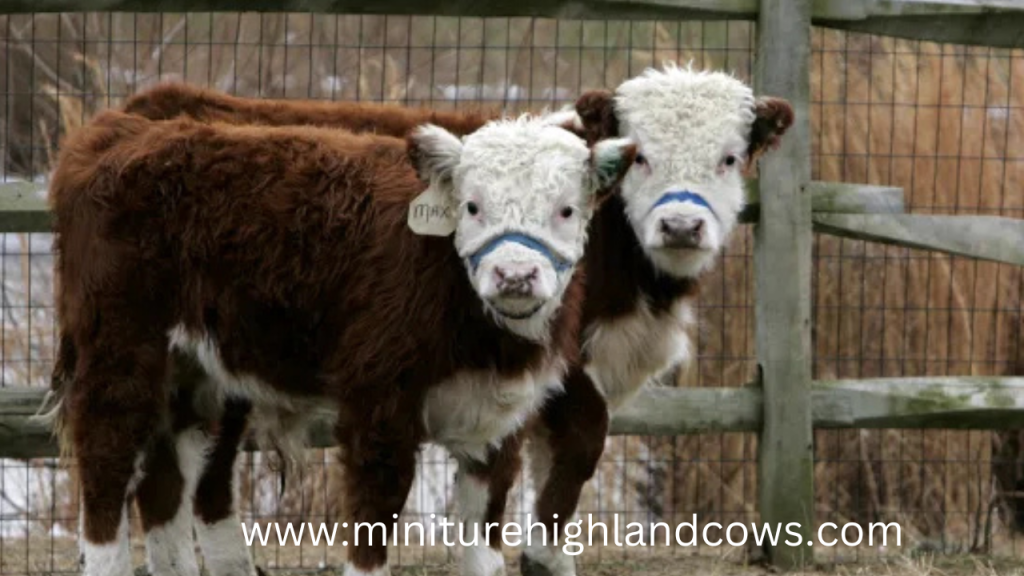
Where to Buy Micro Miniature Cows :
- Specific Breeders: A specific breeder might specialize in micro miniature cows and sell them. Look for such breeders through online directories, cattle registries, or social media pages specifically designed for miniature livestock. Be sure to ask the seller about the health and lineage of the animals, besides checking whether they are registered with breed associations.
- Livestock Auctions: Livestock auctions can be a source for miniature and micro miniature cows, depending on where you live. Sales for livestock can be less predictable than other forms of accessing these cattle, so look carefully at the specific cattle being sold.
- Online Sources: Craigslist, Facebook Marketplace, and other agricultural listing sites have Miniature or Micro-miniature cows listed in many places. Use the filter by location to find some in your area.
- Farmers and Agricultural Shows: One may find show breeders of micro miniature cattle in local agricultural fairs or shows. He may also be able to give an idea of who has the cattle available or get you access to other buyers or sellers.
Things to Consider When Purchasing Micro Miniature Cows:
- Price: Micro miniature cows are quite expensive. For micro cows, there is a price that ranges from $4,000 to $20,000 depending on the size, quality, and lineage of the cow.
- Size: The sizes for the micro miniature cows are usually very small. They usually get to be smaller than 36 inches at the shoulder, weighing between 300 to 500 pounds.
- Purpose: Many buyers purchase micro miniature cows primarily for the sake of companionship, to serve as a novelty, or small-scale farming; however, it requires the same level of care and attention that full-sized cattle receive.
- Health and Maintenance: The cow must be healthy. Vaccinations and proper care are to be provided. Smaller cows may sometimes have specific health requirements that are very essential to look for in a reputable breeder.
If you do purchase a micro miniature cow, do your due diligence and research who is breeding them, ensure you get all health records of the cows, and know whether they are right for your property and your ability in caring for them. Also take note of any regulations which may pertain to where you live, about keeping livestock.
Size and Appearance
The adult miniature Highland cow stands at around 36 to 42 inches at the shoulder. This obviously means they are much smaller than their full-size cousins, who stand at up to 48 inches or more. While that small stature puts them in the weight category of around 500-700 pounds, an average Highland cow weighs in at 1,100-1,800 pounds. Although mini Highland cattle are smaller in stature, they carry on some characteristics distinctive to the breed: thick, woolly double coats, which include an outer lengthy hair layer that helps in surviving the cold and wet environments. This coat usually turns light brown, red, or black, and long horns that sweep over their faces only add to their majesty.
Their facial expressions together with their fur coat and wide eyes make them uniquely adorable and approachable. Therefore, it is no wonder that they become a darling in petting zoos, agricultural exhibits and often even Instagram stars. It is due to their fluffy, curly fur and especially a rather calm nature.
Temperament and Behavior
Miniature Highland cows are very friendly and docile in nature. That is why they have gained much popularity with the small farmers. Generally, these miniature Highland cows are easy to handle and can be quite affectionate with their owner, especially if they have been brought up with human interaction from a young age. Calm nature makes them not so violent as larger breeds that can sometimes be aggressive in nature.
This gentle disposition also makes them great companions with other animals, including livestock, and tends to get along well in mixed herds. Miniature Highland cows are smart animals that can be trained to follow simple commands, which makes them suitable for a variety of farm settings.
Care and Maintenance
Though miniature Highland cows are much smaller, easier to manage, and less taxing as compared to their full-sized equivalent, proper care and attention are needed to thrive. Thicker coats make such animals hardy animals well suited to cold climates. In more temperate climates, they require trimming of coats to prevent overheating, sometimes shade, or cool fresh water for easy comfort.
Miniature Highland cows feed mainly on grass, as their larger cousins do. Sometimes, they need supplemental feeding when there is not much to forage, or in the cold winter months. Their diet must be balanced so that they get enough nutrient intake to keep them healthy. They feed less than bigger cows, and, therefore, their feeding needs must be kept under close observation.
Uses and Popularity\
\These small animals have not only a cute appearance but also serve several practical purposes. Some owners breed the miniature Highland cows for beef production, knowing that its beef is renowned for its leanness and flavor. The demand for miniature Highland beef is smaller compared to regular-sized beef; however, their niche market caters to those looking for specialty meat products.
Others will raise these cows as a hobby or pets. They are ideal for shows because of their good looks and gentle disposition. In addition to the trend toward smaller livestock, mini Highland cattle become sought after by those with small acreage, or individuals who wish to experience cattle ranching without a commitment to a large tract of land or massive cattle breeds.
Besides the many applications in farming, miniature Highland cows are also used for agri-tourism purposes since people visit to see the animals. The friendly nature and easy-going personality of these miniature Highland cows do suit them for farm visits and animal encounters where there is a possibility of families meeting, letting children touch and learn about cattle up close.
Conclusion
Adult miniature Highland cows are beautiful and practical since you get the full Highland look and personality in an easier package. They are popular with small-scale farms, hobbyists, and agritourism because they are hardy and pleasing to look at. Small-sized ones can be easier to handle, but proper diet, health, and sheltering have to be provided in accordance to their nature. These miniature cows, whether considered as a pet, a show animal, or small-scale beef producer, have captured the hearts of most lovers and producers of animals.
Here are some FAQs about adult miniature Highland cows.
1. What is an adult miniature Highland cow?
An adult miniature Highland cow is more like a miniature version of a classic Highland cattle breed. They range from about 36 to 42 inches at shoulder height, being almost half that of a full-sized Highland cow. Miniature Highland cows weigh between 500 to 700 pounds. In contrast to the big cousins, miniature Highland cows sport the same shaggy features and the longer horns in a more compact form.
- How much does an adult miniature Highland cow cost?
The price for an adult miniature Highland cow can be pretty variable based on age, quality, genetics, and whether or not they are registered with a breed association. Typical prices range from $2,000 to $10,000, though the better genetics or some good desirable characteristics can cost you much more.
3. What are miniature Highland cows used for?
Miniature Highland cows are mostly raised for;
- Pets: They are gentle and more docile, thus making good pets for small-scale farms.
- Beef Production: The beef produced is lean and of high quality hence delicative, and most niche markets prefer such meat quality.
- Show Animals: They are popular mainly due to their attractive appearance.
- Agritourism: Most farms use them for an education-based visit, farm tour, or petting zoo.
4. How long do miniature Highland cows live?
Miniature Highland cows can live for 12 to 20 years depending upon health, genetics, and care. Proper nutrition, regular veterinary attention, and good living conditions will contribute to a longer, healthier life.
5. How do I care for a miniature Highland cow?
Miniature Highland cows are relatively low-maintenance but still require proper care:
- Shelter: They need to have a dry protected place free from extreme weather conditions.
- Diet: They have to be provided fresh pasture for grazing. During winter or where grass is not available, they have to be supplemented with feeding such as hay or silage.
Water: It must be always supplied clean fresh water to the goats.
Grooming: Their long thick coat can require regular grooming especially in warmer areas as to not get overly warm. - Health: Veterinary checks are also needed, including vaccinations, parasite control, and checking for hooves problems.
6. Are miniature Highland cows good with other animals?
Yes, miniature Highland cows are relatively docile animals and can get along well with other animals. They are social animals and often do well in a herd of other cows, goats, and even sheep. However, these animals should be gradually introduced to others to ensure they get along.
7. Do miniature Highland cows require special housing?
They can tolerate most climates, but they do need some shelter. They must have a dry draft-free place to shield them from extreme cold or wet weather. In warmer climates, you’ll probably need to clip those thick coats back to prevent them from becoming too hot.
8. What is the main difference between a miniature Highland cow and a regular Highland cow?
The main variation is in their size. Miniature Highland cows are around half the size of other Highland cows, at 36-42 inches tall and weighing 500-700 pounds, whereas the standard breed can reach over 48 inches and weigh 1,100-1,800 pounds. Even though they are smaller, miniature Highlands keep the same characteristic shaggy coat and long horns.
9. Are miniature Highland cows difficult to train?
Yes, the miniature Highland cow is intelligent and of a mild nature; so, by proxy, they are relatively easy to train. However, some remain only capable of learning basic commands, whereas it may sometimes be possible to train them to walk on a halter and perform other simple maneuvers. Helping to get them up early and socializing the young, combined with good positive reinforcement, all helps them get used to people.
10. How do I go about finding a miniature Highland cow?
Small Highland cows may be obtained from breeders, livestock auction houses, Craigslist or Facebook Marketplace, or even agricultural shows and fairs. Obtain the health record and pedigree prior to sale.
11. Are miniature Highland cows good milk producers?
Although miniature Highland cows can be milked, the milking is much smaller compared to regular dairy cows. More people do not raise them for the milk but can certainly use for personal purposes or in small amounts when making cheese or butter.
12. **How do miniature Highland cows handle cold weather?
Miniature Highland cows are excellent for cold climates. Since they have a double-layered coat which is thick, they could tolerate the harshest winter climatic condition without any problem. They are somewhat cold-hardy animals, but above all, they tend to be more hardy than many other breeds. Still, they should have some form of shelter during extreme weather as protection from wind and rain.
13. **Are miniature Highland cows good as pets?
Yes, miniature Highland cows make a fashionable pet since they are remarkably gentle and friendly. They may be adapted well to small-sized farms or homesteads because they are small and compact as they can be easier to care for. However, this is like any other animal; they need the proper care, attention, and space so they will remain fit and healthy.
14. What is an ideal climate for miniature Highland cows?
Miniature Highland cows do exceptionally well in cooler climates, as they have rather thick coats, for which they have grown accustomed to living with. However, provided they have their coats regularly groomed to make them less thick and access to lots of water and shade, it is possible that they could adapt to warmer climates.
Answers to the above questions will help prospective buyers and the caretakers of miniature Highland cows in knowing what is required to ensure that such beautiful animals live in healthy, happy, and the best environments.
